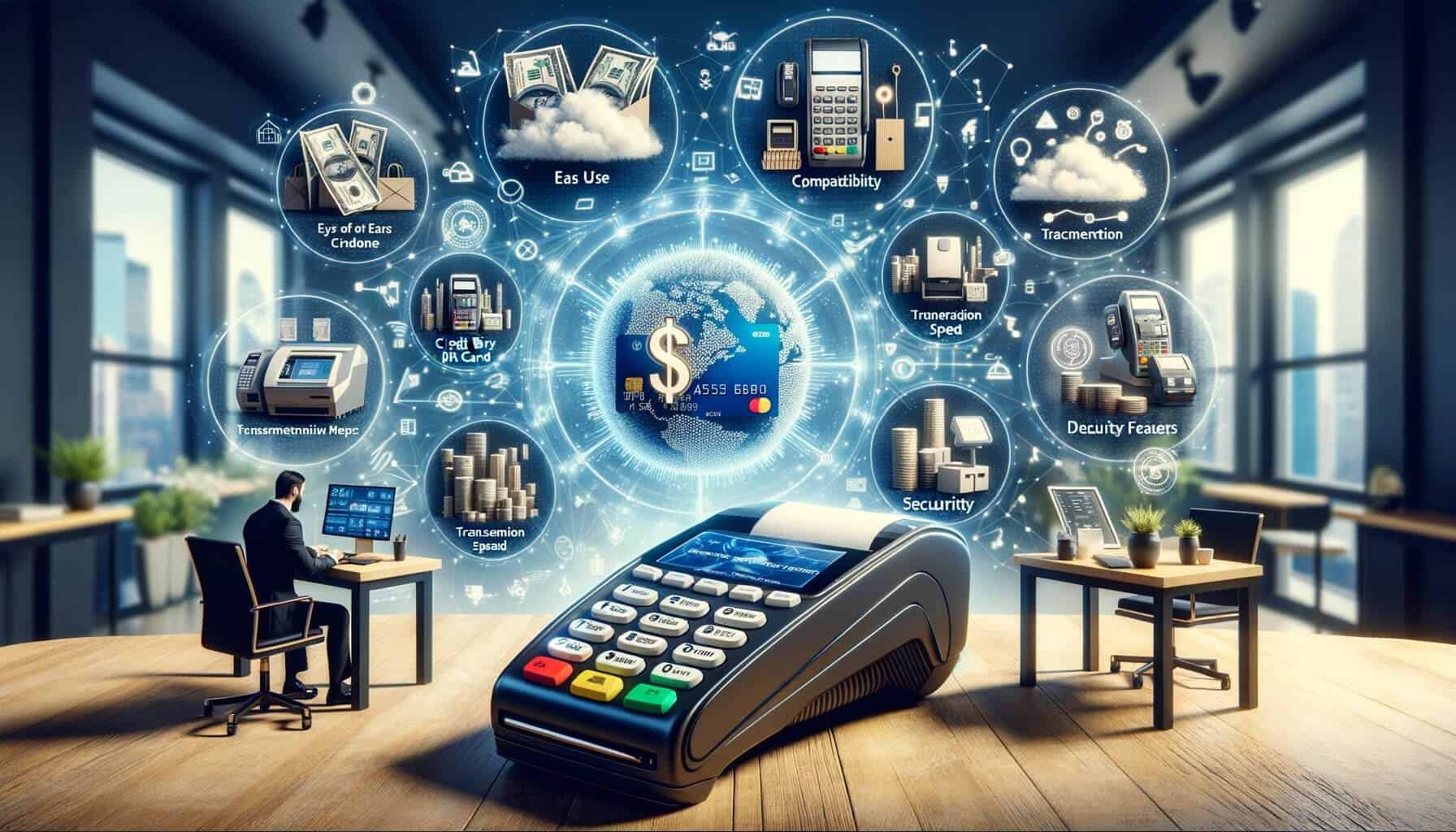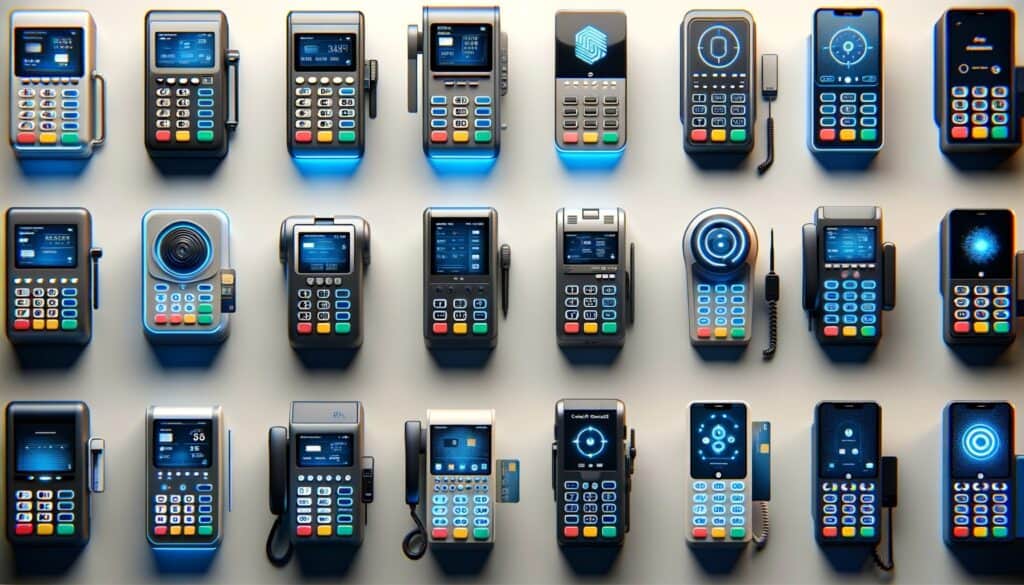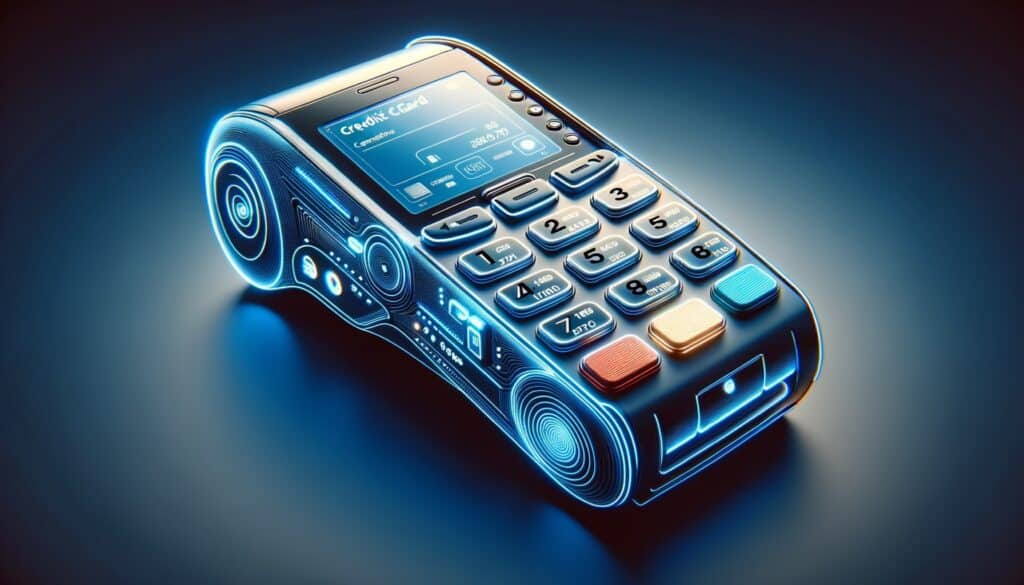
By Harriet Forster March 24, 2025
In today’s digital age, accepting credit card payments is essential for businesses of all sizes. Whether you run a small retail store or a large e-commerce platform, having a reliable and efficient credit card machine is crucial for smooth transactions and customer satisfaction. However, with numerous options available in the market, choosing the best credit card machine for your business can be a daunting task.
This comprehensive guide will walk you through the factors to consider, types of credit card machines, key features to look for, cost evaluation, payment processing and security, compatibility and integration options, and a step-by-step guide to help you make an informed decision.
Factors to Consider When Choosing a Credit Card Machine for Your Business

Before diving into the different types of credit card machines, it’s important to understand the factors you should consider when making a decision. These factors will help you narrow down your options and choose a credit card machine that aligns with your business needs. Here are some key factors to consider:
1. Business Type and Size: The nature and size of your business play a significant role in determining the type of credit-card-machine you should choose. For instance, if you have a brick-and-mortar store, a countertop terminal might be suitable, while an e-commerce business might require a virtual terminal or mobile card reader.
2. Payment Volume: Consider the average number of credit card transactions your business processes daily. If you have a high volume of transactions, you might need a credit-card-machine with faster processing capabilities and a higher transaction limit.
3. Connectivity Options: Determine the type of connectivity options available in your business location. Credit card machines can be connected via Ethernet, Wi-Fi, or cellular networks. Choose a machine that is compatible with your existing infrastructure.
4. Security Features: Protecting your customers’ sensitive payment information should be a top priority. Look for credit card machines that comply with Payment Card Industry Data Security Standard (PCI DSS) requirements and offer encryption and tokenization features.
5. Customer Support: Consider the level of customer support provided by the credit-card-machine provider. Look for a provider that offers 24/7 technical support and assistance to ensure smooth operations.
6. Cost and Pricing Structure: Evaluate the upfront costs, transaction fees, and any additional charges associated with the credit card machine. Compare pricing structures of different providers to find the most cost-effective option for your business.
7. Integration with POS System: If you already have a point-of-sale (POS) system in place, ensure that the credit-card-machine is compatible and can seamlessly integrate with your existing system.
8. Future Scalability: Consider your business growth plans and choose a credit card machine that can accommodate your future needs. Scalability is crucial to avoid the hassle of switching machines as your business expands.
9. User-Friendliness: Look for a credit card machine that is easy to use and has a user-friendly interface. This will minimize training time for your staff and ensure smooth operations.
10. Reputation and Reviews: Research the reputation and customer reviews of different credit-card-machine providers. Look for providers with positive feedback and a track record of reliability and customer satisfaction.
By considering these factors, you can narrow down your options and choose a credit card machine that best suits your business requirements.
Types of Credit Card Machines: A Comprehensive Overview

Credit card machines come in various types, each catering to different business needs. Understanding the different types will help you choose the most suitable option for your business. Here are the most common types of credit card machines:
1. Countertop Terminals: Countertop terminals are stationary machines typically found in brick-and-mortar stores. They are connected to a phone line or internet connection and allow customers to swipe, insert, or tap their credit cards for payment. These machines are reliable, secure, and offer fast transaction processing.
2. Wireless Terminals: Wireless terminals are portable credit-card-machines that use Wi-Fi or cellular networks for connectivity. They are ideal for businesses that require mobility, such as food trucks, delivery services, or trade shows. Wireless terminals offer flexibility and convenience, allowing you to accept payments anywhere within the network range.
3. Mobile Card Readers: Mobile card readers are small devices that can be attached to smartphones or tablets, turning them into credit-card-machines. They connect via Bluetooth or audio jack and are perfect for businesses on the go, such as pop-up shops or service providers. Mobile card readers are compact, affordable, and offer flexibility in accepting payments.
4. Virtual Terminals: Virtual terminals are software-based solutions that allow businesses to accept credit card payments through a computer or laptop. They are commonly used for e-commerce businesses or businesses that receive payments over the phone. Virtual terminals offer convenience and flexibility, as they can be accessed from any location with an internet connection.
5. Point-of-Sale Systems: Point-of-sale (POS) systems are comprehensive solutions that combine hardware and software to manage various aspects of a business, including inventory management, sales reporting, and payment processing. POS systems often include a credit-card-machine as part of their package, providing an all-in-one solution for businesses.
Each type of credit card machine has its own advantages and limitations. Consider your business needs, mobility requirements, and budget to determine the most suitable type for your business.
Key Features to Look for in a Credit Card Machine

When choosing a credit card machine, it’s important to look for key features that enhance functionality, security, and user experience. Here are some essential features to consider:
1. EMV Chip Card Reader: EMV chip cards provide an added layer of security compared to traditional magnetic stripe cards. Look for a credit card machine that supports EMV chip card reading to protect your business from liability in case of fraudulent transactions.
2. Near Field Communication (NFC) Capability: NFC technology enables contactless payments, allowing customers to make payments by simply tapping their cards or mobile devices. Look for a credit card machine that supports NFC capability to cater to customers who prefer contactless payments.
3. Receipt Printing Options: Consider whether you need a credit card machine that can print paper receipts or if digital receipts via email or SMS are sufficient for your business. Some machines offer both options, providing flexibility to cater to different customer preferences.
4. Touchscreen Interface: A touchscreen interface makes it easier for your staff to navigate through the credit card machine’s functions. Look for a machine with an intuitive and user-friendly touchscreen interface to minimize training time and errors.
5. Multiple Payment Options: Ensure that the credit card machine supports various payment methods, including credit cards, debit cards, mobile wallets, and gift cards. Offering multiple payment options enhances customer convenience and satisfaction.
6. Offline Mode: In case of internet or network connectivity issues, having an offline mode feature allows you to continue accepting payments. Look for a credit card machine that can store and process transactions offline, syncing them once connectivity is restored.
7. Customizable Receipts: Some credit card machines allow you to customize the receipts with your business logo, contact information, and promotional messages. This adds a professional touch and helps promote your brand.
8. Integration with Accounting Software: If you use accounting software to manage your business finances, consider a credit card machine that seamlessly integrates with your software. This integration streamlines your accounting processes and eliminates manual data entry.
9. Analytics and Reporting: Look for a credit card machine that provides detailed analytics and reporting features. These insights can help you track sales, identify trends, and make informed business decisions.
10. Scalability: Choose a credit card machine that can accommodate your business growth. Scalability is crucial to avoid the hassle of switching machines as your transaction volume increases.
By considering these key features, you can ensure that the credit card machine you choose meets your business requirements and enhances your payment processing capabilities.
Evaluating the Cost and Pricing Structure of Credit Card Machines
When choosing a credit card machine, it’s important to evaluate the cost and pricing structure to ensure it aligns with your budget and offers the best value for your business. Here are the key cost factors to consider:
1. Upfront Costs: Some credit card machine providers charge an upfront cost for the hardware. Consider your budget and compare the upfront costs of different providers. Keep in mind that higher upfront costs might indicate better quality and features.
2. Transaction Fees: Transaction fees are charged for each credit card transaction processed through the machine. These fees can vary depending on the provider and the type of transaction (swiped, inserted, or tapped). Compare the transaction fees of different providers to find the most cost-effective option for your business.
3. Monthly Fees: Some providers charge monthly fees for using their credit card machines. These fees can include maintenance, software updates, and customer support. Evaluate the monthly fees and consider the value you receive in return.
4. Additional Charges: Be aware of any additional charges that might be associated with the credit card machine. These charges can include setup fees, cancellation fees, PCI compliance fees, and chargeback fees. Read the terms and conditions carefully to avoid any unexpected costs.
5. Contract Terms: Some providers require businesses to sign a contract for a specific period. Consider the contract terms, including the length of the contract and any early termination fees. Opt for providers that offer flexibility and shorter contract terms.
6. Equipment Leasing: Instead of purchasing the credit card machine outright, some providers offer equipment leasing options. Leasing allows you to pay a monthly fee for the machine without the upfront cost. Evaluate the leasing terms, including the total cost over the lease period and the ownership rights at the end of the lease.
7. Volume Discounts: If your business processes a high volume of transactions, inquire about volume discounts. Some providers offer discounted transaction fees for businesses with a large transaction volume. Take advantage of these discounts to reduce your overall costs.
8. Hidden Costs: Carefully review the pricing structure and terms to identify any hidden costs. These can include additional charges for software updates, customer support, or technical assistance. Transparency is crucial to avoid unexpected costs down the line.
9. Return Policy: In case you are not satisfied with the credit card machine or it doesn’t meet your business requirements, check the provider’s return policy. Ensure that you have the option to return or exchange the machine within a reasonable timeframe.
10. Value for Money: Consider the overall value you receive for the price you pay. Evaluate the features, functionality, customer support, and reputation of the provider to determine if the cost is justified.
Understanding the cost and pricing structure of credit card machines will help you make an informed decision and choose a provider that offers the best value for your business.
Payment Processing and Security with Credit Card Machines
Payment processing and security are critical aspects to consider when choosing a credit card machine. Ensuring the safety of your customers’ payment information and providing a seamless payment experience are essential for building trust and loyalty. Here are some key considerations regarding payment processing and security:
1. Payment Processing Speed: The speed at which a credit card machine processes transactions can impact customer satisfaction and overall efficiency. Look for a machine that offers fast processing speeds to minimize waiting times for your customers.
2. Payment Gateway Integration: If you have an e-commerce business, ensure that the credit card machine integrates seamlessly with your payment gateway. This integration allows for secure online transactions and ensures that payments are processed smoothly.
3. Payment Acceptance: Consider the types of payments the credit card machine can accept. It should be able to process major credit cards, debit cards, mobile wallets, and gift cards. Offering a wide range of payment options enhances customer convenience and satisfaction.
4. Payment Security: Protecting your customers’ payment information is crucial to maintain trust and prevent fraud. Look for credit card machines that comply with Payment Card Industry Data Security Standard (PCI DSS) requirements. These machines encrypt payment data and provide secure transmission to the payment processor.
5. Tokenization: Tokenization is a security feature that replaces sensitive payment information with a unique token. This token is used for transaction processing, while the actual payment data is stored securely by the payment processor. Look for credit card machines that offer tokenization to enhance security and reduce the risk of data breaches.
6. Encryption: Encryption is the process of converting payment data into a coded format that can only be deciphered by authorized parties. Look for credit card machines that offer end-to-end encryption to protect payment data during transmission and storage.
7. Fraud Prevention: Consider the fraud prevention measures offered by the credit card machine provider. Look for features such as address verification, card verification value (CVV) verification, and real-time fraud detection. These features help minimize the risk of fraudulent transactions.
8. Chargeback Management: Chargebacks occur when a customer disputes a transaction and requests a refund from their credit card issuer. Look for credit card machines that offer chargeback management tools to help you efficiently handle and resolve chargeback disputes.
9. Data Reporting and Analytics: Analyzing payment data can provide valuable insights into your business performance and customer behavior. Look for credit card machines that offer detailed reporting and analytics features, allowing you to track sales, identify trends, and make data-driven decisions.
10. Compliance with Industry Standards: Ensure that the credit card machine provider complies with industry standards and regulations. This includes adhering to PCI DSS requirements, as well as any local or regional regulations governing payment processing.
By prioritizing payment processing speed, security features, and compliance with industry standards, you can ensure a seamless and secure payment experience for your customers.
Assessing Compatibility and Integration Options for Your Business
Compatibility and integration options are crucial considerations when choosing a credit card machine. Ensuring that the machine seamlessly integrates with your existing infrastructure and software systems is essential for smooth operations. Here are some key aspects to assess regarding compatibility and integration:
1. Point-of-Sale (POS) System Integration: If you already have a POS system in place, ensure that the credit card machine is compatible and can integrate with your existing system. This integration allows for seamless communication between the credit card machine and the POS system, streamlining your operations.
2. E-commerce Platform Integration: If you operate an online store, consider the integration options with your e-commerce platform. Look for credit card machines that can integrate with popular e-commerce platforms such as Shopify, WooCommerce, or Magento. This integration ensures that online transactions are processed smoothly and data is synchronized between systems.
3. Accounting Software Integration: If you use accounting software to manage your business finances, consider a credit card machine that integrates with your accounting software. This integration eliminates the need for manual data entry and ensures accurate and up-to-date financial records.
4. Inventory Management Integration: If you have an inventory management system, evaluate the integration options with the credit card machine. Look for machines that can update inventory levels in real-time, allowing for accurate stock management
Step-by-Step Guide: How to Choose the Best Credit Card Machine for Your Business
1. Assess your business needs: Consider the type of business you run, transaction volume, cost, payment options, and customer support requirements.
2. Research credit card machine providers: Compare the top providers in the market based on pricing, features, customer reviews, and customer support.
3. Determine connectivity options: Assess the connectivity options available in your business location and choose a credit card machine that can easily connect to your existing infrastructure.
4. Evaluate security features: Look for credit card machines that offer encryption, tokenization, and EMV chip technology to ensure the security of customer data.
5. Consider speed and efficiency: Choose a credit card machine with fast processing speeds and minimal downtime to provide a seamless customer experience.
6. Assess user-friendly interface: Opt for a credit card machine with an intuitive interface that is easy for both employees and customers to navigate.
7. Check integration options: If you have a POS system in place, ensure that the credit card machine seamlessly integrates with it for streamlined transactions and accurate reporting.
8. Verify compatibility with payment processor: Ensure that the credit card machine is compatible with your preferred payment processor to avoid any compatibility issues.
9. Compare pricing and fees: Consider the upfront cost of purchasing the machine and any ongoing fees or charges associated with its use. Find a balance between affordability and functionality.
10. Make a decision: Based on your research and assessment, choose the credit card machine that best meets your business needs and budget.
Frequently Asked Questions (FAQs) about Credit Card Machines
Q.1: What is a credit card machine?
Answer: A credit card machine is a device that allows businesses to accept credit card payments from customers. It securely transmits transaction information to the payment processor for verification and funds transfer.
Q.2: How do credit card machines work?
Answer: Credit card machines use encryption technology to securely transmit transaction information to the payment processor. The processor communicates with the customer’s bank to verify the transaction and transfer funds to the merchant’s account.
Q.3: What are the different types of credit card machines?
Answer: There are various types of credit card machines, including countertop machines, mobile card readers, and virtual terminals for online businesses. Each type caters to different business needs and requirements.
Q.4: How do I choose the right credit card machine for my business?
Answer: Consider factors such as the type of business, transaction volume, cost, payment options, customer support, connectivity options, security features, speed and efficiency, user-friendly interface, integration options, and compatibility with your payment processor.
Q.5: Can I use any credit card machine with my preferred payment processor?
Answer: Not all credit card machines are compatible with every payment processor. It’s important to ensure that the machine you choose is compatible with your preferred processor to avoid any compatibility issues.
Conclusion
Choosing the best credit card machine for your business is a crucial decision that can impact your daily operations and customer satisfaction. By considering factors such as the type of business, transaction volume, cost, payment options, customer support, connectivity options, security features, speed and efficiency, user-friendly interface, integration options, and compatibility with your payment processor, you can make an informed decision.
Remember to research and compare the top credit card machine providers in the market to find the one that best suits your business needs. With the right credit card machine in place, you can provide a seamless payment experience for your customers and streamline your business operations.